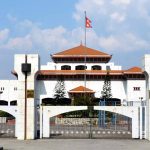
Nepal’s Supreme Court has ordered the release of Rastriya Prajatantra Party (RPP) Senior Vice President Ravindra Mishra, who was arrested on the evening of March 28 following a violent protest by pro-monarchy supporters.
According to Assistant Spokesperson Nirajan Pandey, the joint bench of Justices Kumar Chudal and Til Prasad Shrestha ruled that Mishra be released under the custody of his legal representative, on the condition that he appear at the District Police Office when required.
The Court stated that most evidence related to Mishra has already been collected, and if further information is needed, there is no reason it cannot be gathered without keeping him in custody.
“Looking at the current stage of investigation, it appears that most evidence related to the petitioner has been collected. If further evidence is needed, it can be obtained without keeping him in detention. Therefore, the Court sees no justification for his continued custody and orders his immediate release under the responsibility of his legal counsel,” the brief ruling states.
Mishra had been in custody for 49 days.
Why Was Mishra Detained?
He was detained following violent clashes during a royalist protest on March 28. Later, the government decided to investigate him under criminal riot charges, prompting his wife Sarika Karki to file a habeas corpus petition demanding his release.
On Wednesday, a bench led by Justice Sunil Kumar Pokhrel had ordered that Mishra be brought before the court within 24 hours along with the case files. He was presented in court on Friday morning.
What Did Mishra Say After His Release?
Speaking after his release on Friday evening, Mishra said he had never anticipated the protest would turn tragic and that he had no role in planning any violence.
“Large-scale protests often go out of control — whether they’re organized by activists or monitored by the state. The same has happened in past movements like those in 1990, 2006, the Madhes movement, and the Tharu protests,” Mishra said. “Despite advocating for peaceful transformation and national consensus, the incident turned tragic.”
He added that although he fully cooperated with the police investigation, he felt deprived of his rights as a citizen, which is why he turned to the court.
“The case is still ongoing. I’ve only been released on bail, so I’m not celebrating,” he said. “I am a political person advocating for the restoration of the monarchy, but I have not committed any crime against the state, nor have I been involved in organized crime or any kind of criminal riot.”
Reaction from RPP
RPP President Rajendra Lingden, speaking to the BBC, welcomed the Supreme Court’s decision and said it proves that “justice is still alive” in Nepal.
“The Court’s decision gives hope — even if it’s just a little,” he added.
Charges Against Mishra
Following the March 28 violence in Tinkune, police arrested Mishra along with RPP General Secretary Dhawal Shamsher Rana and several others.
Citing health reasons, Rana was released on bail on April 19. However, other individuals, including controversial figure Durga Prasai, arrested around the same time, remain in custody.
Police had been investigating Mishra under charges of offenses against the state and organized crime, and later extended the investigation to include criminal riot charges, which led to the habeas corpus petition.
Government officials defended the extension of custody, stating that investigations were still ongoing and further statements were required.
What Happened on March 28?
The protest by pro-monarchy groups in Kathmandu’s Tinkune area turned violent, resulting in the deaths of two people, including a television journalist, and injuries to over 100 others.
Several private homes and vehicles were set on fire, and to control the situation, security forces used tear gas and live ammunition. The Nepal Army was also deployed to restore order.










